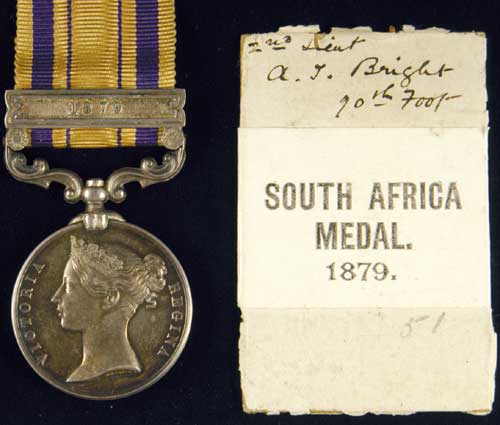
Auction: 7012 - Orders, Decorations, Medals & Militaria
Lot: 1017
An Important Kambula Casualty South Africa 1879 Medal to Second Lieutenant A.T. Bright, Who Lost His Life at the Head of his Men Counter Attacking the Zulu Impi at the Point of the Bayonet South Africa 1877-79, one clasp, 1879 (2nd Lieut: A.T. Bright. 90th Foot.), virtually mint state, with original named lid of card box of issue, and registered envelope addressed to next of kin, and photographic image of recipient Estimate £ 4,000-4,500 Second Lieutenant Arthur Tyndall Bright, of Woodcote, Aigburth, Liverpool; born 1857; educated under the Reverend T. Browning, at Thorpe Mandeville and thence to Eton 1870-75; his Head of House upon hearing of his death wrote of him, ´his principles were high, his sense of honour unblemished, and his love for liberty that he knew was given to him to use and not abuse unbounded.... For two years a member of the eight, second to none as a foot-ball player, a keen and excellent volunteer officer..... Eton was as dear to him as he was to Eton´; entered Sandhurst, February 1877, and passed out the following December once again drawing praise this time from Major Williams of the College, ´When Colonel, now General Sir Evelyn Wood asked me one day if I could name to him a lad for his regiment, then about to sail for the Cape, whose characteristics should be ´perfect gentleman and keen soldier´, I could and did without a moment´s hesitation answer, ´Yes Arthur Tyndall Bright´´; commissioned Second Lieutenant 90th Light Infantry, January 1878, and a month later embarked for the Cape; arrived in South Africa and joined his corps in the Perie bush, twenty miles north of King William´s Town and on termination of the hostilities with the Gaikas Bright proceeded with the headquarters and five companies under the command of Colonel Evelyn Wood to march overland to Natal; the force arrived in Maritzburg ten weeks later and remained there until the 20th October 1878, when they were ordered to Utrecht, Transvaal, the future base of operations for Wood´s column; Bright, a talented artist was initially employed in the weeks leading up to the outbreak of the Zulu War to sketch certain positions and in the successful expedition undertaken by Colonel Wood into Zululand, for the purpose of affording protection to a tribe which had declared for British rule, Bright was selected to accompany Wood and to sketch the Zlobane Mountain stronghold; the column attacked the latter on 28.3.1879, resulting in an enemy counter attack on Wood´s men at their camp in Kambula the following day; due to casualties suffered from the attack on the 28th Bright was elevated to the command of "G" Company, ´The enemy flushed with their recent success, made the most determined onslaught, approaching again and again to within a few yards of the position held by the column. When for three long hours the defenders of the laager had stoutly resisted them, and dense masses still congregating in the valley beneath showed that a final effort would yet be made, Wood decided on making a counter attack. For this purpose two companies of the 90th were ordered to advance, and at the point of the bayonet force back the threatening impi. One of these two was the G Company , and those who knew Arthur Tyndall Bright can realize with what pride he placed himself in front of the advancing line. It was in this position, while gallantly leading and cheering on his men, that he received his death wound. Though he was tenderly watched and cared for by the medical attendants, and by his faithful servant, he only lingered for a few hours, his name being added, ere the day was quite spent, to the glorious roll of those who have rendered up their lives for Queen and country." The Washing of Spears adds further detail ´A shot drilled through Arthur Bright´s thigh, missing the bone but drenching him in blood´. General Sir Evelyn Wood, writing upon the life of Arthur Bright, says:- "Arthur Tyndall Bright was a beautiful character, wrote a former comrade, when he heard that the brave young life had been given up on the very threshold of manhood. It was given up in the light of victory. He had sought the post of danger with honourable eagerness, and his unstained past fitted him to encounter sudden death, but it was hard for his surviving friends to realize that he was gone, for he was lively in the best sense of the word. His high spirit, ballasted as it was by a conscientious firmness of mind not common at his age, his cheery grace of manner, his vigour in manly sports, all combined to make him one of those foremost figures in life´s groups that seem alike to impress and attract friends. He excelled, too, in the lighter accomplishments, and his sweet, clear voice was greatly appreciated by the soldiers, who used to take especial pleasure in hearing him sing such ballads as ´Nancy Lee´ and ´Far Away´, for soldiers on active service delight in pathetic music, perhaps because there is a sense of impending farewell in times when no one knows what a day may bring forth. And when the day came that abruptly stilled the voice of the singer, everyone who had known, and therefore loved him, felt that the loss of Arthur Bright was not the loss only of his country, nor even of his personal friends, but that it was, too, a loss to everyone who had been brought into contact with him.´ (The South African Campaign of 1879, Mackinnon and Shadbolt, refers).
Sold for
£10,000




